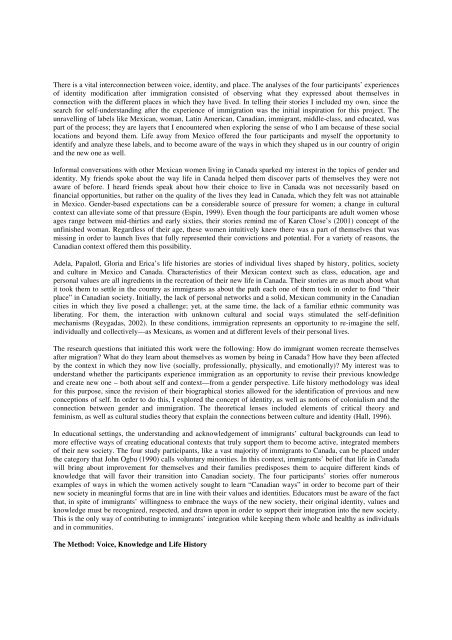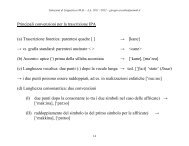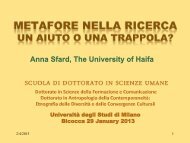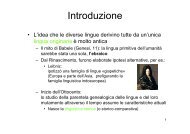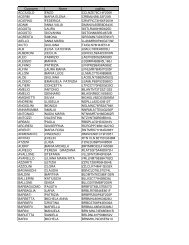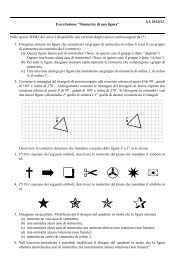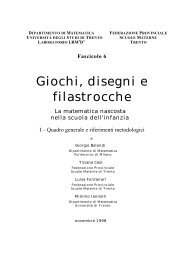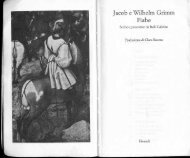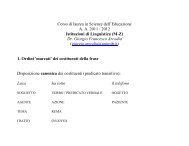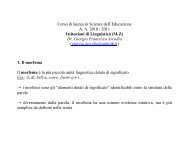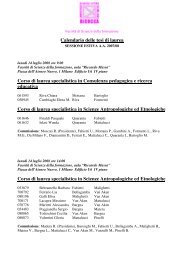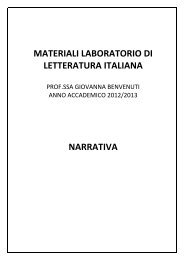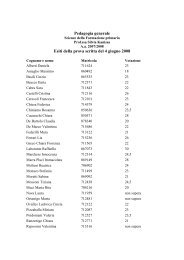Life history research: A contribution to processes of adult learning ...
Life history research: A contribution to processes of adult learning ...
Life history research: A contribution to processes of adult learning ...
You also want an ePaper? Increase the reach of your titles
YUMPU automatically turns print PDFs into web optimized ePapers that Google loves.
There is a vital interconnection between voice, identity, and place. The analyses <strong>of</strong> the four participants’ experiences<br />
<strong>of</strong> identity modification after immigration consisted <strong>of</strong> observing what they expressed about themselves in<br />
connection with the different places in which they have lived. In telling their s<strong>to</strong>ries I included my own, since the<br />
search for self-understanding after the experience <strong>of</strong> immigration was the initial inspiration for this project. The<br />
unravelling <strong>of</strong> labels like Mexican, woman, Latin American, Canadian, immigrant, middle-class, and educated, was<br />
part <strong>of</strong> the process; they are layers that I encountered when exploring the sense <strong>of</strong> who I am because <strong>of</strong> these social<br />
locations and beyond them. <strong>Life</strong> away from Mexico <strong>of</strong>fered the four participants and myself the opportunity <strong>to</strong><br />
identify and analyze these labels, and <strong>to</strong> become aware <strong>of</strong> the ways in which they shaped us in our country <strong>of</strong> origin<br />
and the new one as well.<br />
Informal conversations with other Mexican women living in Canada sparked my interest in the <strong>to</strong>pics <strong>of</strong> gender and<br />
identity. My friends spoke about the way life in Canada helped them discover parts <strong>of</strong> themselves they were not<br />
aware <strong>of</strong> before. I heard friends speak about how their choice <strong>to</strong> live in Canada was not necessarily based on<br />
financial opportunities, but rather on the quality <strong>of</strong> the lives they lead in Canada, which they felt was not attainable<br />
in Mexico. Gender-based expectations can be a considerable source <strong>of</strong> pressure for women; a change in cultural<br />
context can alleviate some <strong>of</strong> that pressure (Espin, 1999). Even though the four participants are <strong>adult</strong> women whose<br />
ages range between mid-thirties and early sixties, their s<strong>to</strong>ries remind me <strong>of</strong> Karen Close’s (2001) concept <strong>of</strong> the<br />
unfinished woman. Regardless <strong>of</strong> their age, these women intuitively knew there was a part <strong>of</strong> themselves that was<br />
missing in order <strong>to</strong> launch lives that fully represented their convictions and potential. For a variety <strong>of</strong> reasons, the<br />
Canadian context <strong>of</strong>fered them this possibility.<br />
Adela, Papalotl, Gloria and Erica’s life his<strong>to</strong>ries are s<strong>to</strong>ries <strong>of</strong> individual lives shaped by <strong>his<strong>to</strong>ry</strong>, politics, society<br />
and culture in Mexico and Canada. Characteristics <strong>of</strong> their Mexican context such as class, education, age and<br />
personal values are all ingredients in the recreation <strong>of</strong> their new life in Canada. Their s<strong>to</strong>ries are as much about what<br />
it <strong>to</strong>ok them <strong>to</strong> settle in the country as immigrants as about the path each one <strong>of</strong> them <strong>to</strong>ok in order <strong>to</strong> find “their<br />
place” in Canadian society. Initially, the lack <strong>of</strong> personal networks and a solid, Mexican community in the Canadian<br />
cities in which they live posed a challenge; yet, at the same time, the lack <strong>of</strong> a familiar ethnic community was<br />
liberating. For them, the interaction with unknown cultural and social ways stimulated the self-definition<br />
mechanisms (Reygadas, 2002). In these conditions, immigration represents an opportunity <strong>to</strong> re-imagine the self,<br />
individually and collectively—as Mexicans, as women and at different levels <strong>of</strong> their personal lives.<br />
The <strong>research</strong> questions that initiated this work were the following: How do immigrant women recreate themselves<br />
after migration? What do they learn about themselves as women by being in Canada? How have they been affected<br />
by the context in which they now live (socially, pr<strong>of</strong>essionally, physically, and emotionally)? My interest was <strong>to</strong><br />
understand whether the participants experience immigration as an opportunity <strong>to</strong> revise their previous knowledge<br />
and create new one – both about self and context—from a gender perspective. <strong>Life</strong> <strong>his<strong>to</strong>ry</strong> methodology was ideal<br />
for this purpose, since the revision <strong>of</strong> their biographical s<strong>to</strong>ries allowed for the identification <strong>of</strong> previous and new<br />
conceptions <strong>of</strong> self. In order <strong>to</strong> do this, I explored the concept <strong>of</strong> identity, as well as notions <strong>of</strong> colonialism and the<br />
connection between gender and immigration. The theoretical lenses included elements <strong>of</strong> critical theory and<br />
feminism, as well as cultural studies theory that explain the connections between culture and identity (Hall, 1996).<br />
In educational settings, the understanding and acknowledgement <strong>of</strong> immigrants’ cultural backgrounds can lead <strong>to</strong><br />
more effective ways <strong>of</strong> creating educational contexts that truly support them <strong>to</strong> become active, integrated members<br />
<strong>of</strong> their new society. The four study participants, like a vast majority <strong>of</strong> immigrants <strong>to</strong> Canada, can be placed under<br />
the category that John Ogbu (1990) calls voluntary minorities. In this context, immigrants’ belief that life in Canada<br />
will bring about improvement for themselves and their families predisposes them <strong>to</strong> acquire different kinds <strong>of</strong><br />
knowledge that will favor their transition in<strong>to</strong> Canadian society. The four participants’ s<strong>to</strong>ries <strong>of</strong>fer numerous<br />
examples <strong>of</strong> ways in which the women actively sought <strong>to</strong> learn “Canadian ways” in order <strong>to</strong> become part <strong>of</strong> their<br />
new society in meaningful forms that are in line with their values and identities. Educa<strong>to</strong>rs must be aware <strong>of</strong> the fact<br />
that, in spite <strong>of</strong> immigrants’ willingness <strong>to</strong> embrace the ways <strong>of</strong> the new society, their original identity, values and<br />
knowledge must be recognized, respected, and drawn upon in order <strong>to</strong> support their integration in<strong>to</strong> the new society.<br />
This is the only way <strong>of</strong> contributing <strong>to</strong> immigrants’ integration while keeping them whole and healthy as individuals<br />
and in communities.<br />
The Method: Voice, Knowledge and <strong>Life</strong> His<strong>to</strong>ry


